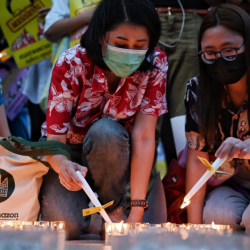The downside of digital learning

Virtual learning during lockdown has been a brand new experience for all students and parents, with both doing their best to come up with the best way to create an effective learning environment.
Not everyone is able to make the most of this technological transformation, though and many are struggling with burnout as they try to adjust to the new normal of online schooling. Some are expressing their frustrations online and calling on the education system for help.
For Jarunya Chongudonlert or Ning as she is known to family and friends, the online learning experience has been physically, mentally, and emotionally draining. She says the workload has been hard enough but it’s the extra effort needed to manage schedules to ensure that all group members are in the same frame that has proved the most taxing.
“That’s been one of the most tiring and tedious parts. Don’t make me do group projects, please. It doesn’t work with online learning. My group members and I are not able to get together face to face to discuss ideas. It’s also difficult to share materials. Miscommunication and misunderstanding kill our team’s productivity,” says Ning, 18.
The grade-12 student has been taking online classes since July 2020. She recalls being slightly confused but excited when hearing that schools would be closed as a result of COVID-19and that classes would move online. She thought it would be fun but once virtual classes started, she discovered was wrong – very wrong.
“I thought that I could wake up five minutes before class. I could wear whatever I wanted for online learning at home. I would have less homework because I was not in the classroom. No haircut, no nail job rules – I would be truly free.
“It turned out to be completely different. I found myself snowed under with assignments. With school projects, tests, quizzes and online classes, it’s been impossible for me to prepare for the entrance examination. I’m sick of this. I feel burnt out. I’m not sure if I can achieve my academic goals in order to reach my dream job,” she says.
Ning wants to study communication art and design and dreams of becoming a successful animator. “I love drawing,” she says.
She continues taking classes online but wants teachers to understand that not every home is conducive to learning.
“The home environment for every student is different. There are no distractions in the classroom so I can stay focused, absorb what I am learning, and remember it. I need silence – something that I can’t get at home,” she says.
Distractions at home have meant that she can’t always complete her work. Procrastinating has resulted in more homework, leading to stress and anxiety. The strict lockdown has prevented her from going shopping and hanging out with friends – activities that help her relax and ease stress.
After spending months sitting in a small room in her house in front of a computer, Ning began to notice the emotional effects of the pandemic. Things went from bad to worse in the first semester of 2021 when she realized that online schooling was having a detrimental effect on her physical and mental well-being, which was further exacerbated by constant distractions, boredom, and overall unhappiness. She says sitting for too long and too much screen time strain her body and mind, leading to back problems, headaches, eyestrain, and depression.
“There was a period when I couldn’t sit to study because my back hurt so much. So I lay in bed and studied. That was terrible. Sometimes I cried for no reason. I feel totally overwhelmed,” Ning says.
According to a 2020 UNICEF-led survey in Thailand, seven in 10 children and young people reported poorer mental health due to the impact of COVID-19 on their lives. Following school closures, more than half said they were worried about their studies, and future education and employment.
UNICEF said in a press release that while countries worldwide are taking some action to provide remote learning, at least 29 percent of primary students are not being reached. In addition to a lack of assets for remote learning, the youngest children may not be able to participate due to a lack of support using the technology, a poor learning environment, pressure to do household chores, or being forced to work.
Last month, the UN agency urged governments to reopen schools for in-person learning as soon as possible and to provide a comprehensive recovery response for students.
Last week, the Bad Student Movement launched a strike campaign on September 6, the first day back to school, on its Facebook page and website to protest against the continuous use of online schooling during outbreaks, saying this has been detrimental to students’ mental health, well-being, and academic achievements. The prominent pro-democracy youth group also pledged to participate in the strike and created a petition, with 8,646 students signing up between September 6-10, the first week of school return.
The group tweeted the petition that includes their reasons for the strike and calls on the government to improve the quality of the Thai educational system and access to effective COVID-19 vaccine for Thai people and students. Its viral tweet #Mai Rean Online Laew E Sus (literally “no more online learning!#@%$&” was Thailand’s No 1. trending hashtag on Twitter on September 7. It got a chorus of nods from students who quickly retweeted and began venting their own frustrations.
Some of the tweets read: “What’s wrong with the Thai education system”, “School is killing me. Wasn’t it’s supposed to educate me?”, “I can’t trust my future to this damn country”, “Online class sucks”, and “I don’t feel I’m learning. I’m stuck. I’m sick of this.”
The pandemic and virtual schooling have affected parents as well. It’s a tough routine for parents to work online at home since they also have to ensure their children’s education.
Thayaporn Mahasurachote, 48, a mother of a 10-year-old, found the switch to fully virtual learning one of the most challenging and unsettling times for her son. As an involved parent and an advocate for her boy, she has done her best to help him thrive amid remote learning at home.
“Being a working mom is hard. The pandemic made it even harder. My days are consumed with checking my boy’s school courses for missing assignments, constantly reminding him that he should be focused on schoolwork and not playing online games or watching YouTube and TikTok videos, while trying to squeeze in time to focus on my business,” she says.
Using technology and social media is definitely distracting young students and affecting their academic performance. Face-to-face learning helps them remain focused in class and get most of their work done.
“My son’s grades are dropping after reverting to virtual instruction. I don’t know what the solution is. I’m afraid he’s falling behind. I know it’s hard to overcome the temptation of just watching online videos,” Thayaporn says.
Prapawadee Taya, a mother of a grade-10 student, echoes Thayaporn’s remarks on the influence of technology on academic distraction.
When asked what concerned her most about online teaching and learning, she says she is worried about the quality of Thai education system, not being to monitor or limit what her daughter sees on the internet, whether she is able to learn as much as if she were in the classroom, and if she fully understands the lessons.
“She has a hard time understanding the remote instructions given to students. They’re not clear. So, students don’t understand what’s expected of them and this is bound to affect their success. On top of that, group projects are a disaster. My daughter doesn’t like them as they are difficult to schedule. She told me she is doing all of the work as some group members are not pulling their weight.” Prapawadee says.
The parents say when school bells ring for the second semester in November, they expect to see the doors swing open and a return to education as usual with students learning in the classroom, not online at home.
Thayaporn hopes that the government and educational experts have alternative plans in place to help all students learn as easily and effectively as possible – both in the classroom and, where unavoidable, through remote instruction.
For Ning, the main hope is that action will be taken to ensure that the physical and mental health of students is not severely affected. The first step to take is maintaining in-person learning as much as possible – which for her means Bangkokstaying out of lockdown.
By Veena Thoopkrajae ith additional report by SukhumapornLaiyok






